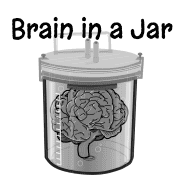Brain in a Jar 2: Your inner GM
There is a part of our minds that acts like a Game Master in a paper game, making and modifying rules, just below our awareness. The results may be good or bad, but learning to be aware of the thing is important.

Brain in a Jar 2: the tiny GM in your head

Abstract:
There is a part of our minds that acts like a Game Master in a paper game, making and modifying rules, just below our awareness. The results may be good or bad, but learning to be aware of the thing is good.
Proposal:
Catching the tiny GM in your brain is as tricky and rewarding as catching a loot troll in Diablo III.
I will, in future posts, discuss how games are an ancient educational system, used by us and other animals to allow learning potentially dangerous skills in a safe way. I look forward to examining how our brains are made for this and how what we describe as ‘fun’ is mix of neurotransmitters and which activities trigger their release.
Meanwhile, I hope most of you will agree with the 6 requirements for games that I use. They are:
A game must be entered knowingly and willingly – The Bartle rule, added after a nice, long, nerdy email discussion with Dr. Richard Bartle; the rest are stolen from Chris Crawford.
A game must occur in a non-real space – games are safe simulations, for learning, since before homo sapiens.
A game must have a goal – the thing we’re learning
A game must have challenges – that we are solving
A game must have rules – to limit and focus solutions to the goal
A game must have an end state – though I now often say ‘graduation’ state, if you play on as a post grad, at a higher difficulty.
These 6 could make a post unto themselves. I only mention them here because I want you to keep them in mind as we imagine a group of children starting a sports game on some empty plot of ground. They automatically know the requirements for a game, thanks to their inner GM’s.
They have already knowingly agreed to play by simply asking, “hey who wants to play a game”. That is how requirement one is met.
Then they move on to creating a non-real space. One child may say something like, “everything beyond the sidewalk, from here to that tree, is out of bounds”. The non-real game space need not be paper or digital. It can be a track or a court or diamond in the real world, but demarked as a place with different rules. The intent is to be safe from real-world harm, during play.
This, BTW, is why Pokemon Go contains an avoidable ludic fallacy, in my opinion. Design malpractice maybe. People can be seriously harmed by ignoring rule two. Children know this.
Gradually, the children spin through the other requirements, setting rules, goals and the end-point, like first team to 5 points and so on. The key thing is, they already know the requirements and implement them, because that is how natural games are made.
Now turn your mind to a memory of being on hold during a phone call. Maybe you were playing Solitaire or Free Cell while you waited. Have you ever caught yourself thinking something like “I don’t want to play a 2 or a 3, I want a face card” and refused to make easy points for vanity? Or have you ever felt the need to play a shooter with only a pistol or melee weapon? Have you ever, with a group of friends, made challenges to play a game with your own, external, made up rules or goals? Have you created a meta-game inside a game?
All of these inclinations come from your inner GM. Somewhere in your head, part of you wants to up the ante and play on expert mode. While not an Earth-shaking revelation, this idea is interesting in relation to classic, Von Neumann, game theory, as used in economics.
In that system, the players are said to be homo economicus, a creature that acts only and always in perfect self-interest. If you, in dollar dictator, offer a 99 to 1 split of 100 dollars, homo economicus will accept your proposal, for it is one dollar more than she or he had before. Real humans will not. They would rather see you both lose, than be insulted. When you tell homo economicus that ratting out a friend is the best solution to the prisoner’s dilemma, they don’t balk. However, real students always react badly to the idea, at first.
We know the requirements for games and we also know that imperfect self-interest can be a social currency – opening a door for someone, bringing a gift, giving a ride, cat sitting. Therefore, I am an advocate for behavioral game techniques. We are not homo economicus.
However, life is not zero sum. It is a mixed strategy game that is won on averages over time. So, sometimes we can benefit from acting like homo economicus. A one percent better interest rate, aggregated with other small improvements can matter, but we rarely lionize bravery in banking. Other times, the renown gained by making a bad thing right, being big about something or protecting the weak is more than worth the imposition, socially.
Your inner GM can help you earn a social score, but can harm your credit rating. Social and economic matters use different rules, but the tiny GM in your head does not. Some things are Von Neumann, some are behavioral. Listen for that tiny GM voice and only take it as advice.
Read more about:
BlogsAbout the Author(s)
You May Also Like







.jpeg?width=700&auto=webp&quality=80&disable=upscale)








